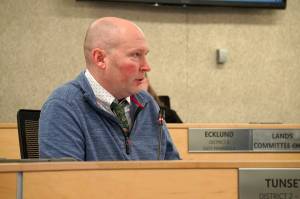Local teens talk about two proposed tobacco laws
Published 5:49 am Friday, March 4, 2016
Two unexpected supporters joined the statewide network of advocates pushing for the passage of a tobacco tax and comprehensive law protecting employees from secondhand smoke in the workplace.
Legally they and their peers aren’t even allowed to smoke. However, the staggering number of Alaska teens reported by the Alaska Department of Health and Social Services to have used tobacco products in 2015 — one out of three — brought Soldotna High School student Jackson Blackwell, 15, and Nikiski Middle School student and cancer survivor Joe Yourkoski, 13, to Juneau for the American Cancer Society Cancer Action Network’s annual citizen’s lobby day.
“It’s not what the adults expect to be honest,” said Emily Nenon, Alaska government relations director for the cancer action network. “It’s a fresh perspective… they are just so articulate, and confident and passionate about what they are talking about that people really take notice and listen to them.”
It was the first year teens joined the cancer action network at the capitol, said Noe Baker, senior specialist of media advocacy for the cancer network. The students spoke to more than 35 legislators, she said.
Blackwell and Yourkoski spoke in favor of SB1, the “Take it Outside Act” sponsored by Sen. Peter Micchiche, R-Soldotna, which would require every operation in the state to adopt laws prohibiting use of tobacco products in and around public spaces and private businesses. They also advocated for Gov. Bill Walker’s SB133 that would put taxes on tobacco products, which is a part of his New Sustainable Alaska Plan. The House of Representatives is circulating its own version of each bill.
Fifteen cancer survivors including Yourkoski, who was diagnosed with acute lymphoblastic leukemia at age 4, attended the lobby day, Baker said.
“I was the only 13 year old smartly dressed walking through the capitol,” Yourkoski said.
His age drew a little of the legislators attention away from the adult advocates, he said.
“I would usually start with ‘hi, my name is Joe Yourkoski and I am here to talk about SB1,” Yourkoski said.
He always tried to drive home how passing the bills would reduce how much the state spends on health care annually.
Millions in health care costs for smokers and non-smokers would be saved in the areas of lung cancer, heart attack and stroke treatments, according to the cancer action network.
“I am survivor of cancer myself so this bill meant a lot to me to help prevent others from going through cancer,” Yourkoski said.
Joe’s mother, Laura Niemczyk, said her son’s cancer did not have a direct link to tobacco use, but there are cancers with unknown causes.
“If it is possible to help people stay healthy, that is important,” Niemczyk said.
“I would bring up how hard and long it took to get treatment through, and how I couldn’t always do things that normal kids would do,” Yourkoski added. “…I think it is good for legislators to hear this kind of story because all day they hear (statistics) and facts but it’s not every day that they get to hear about their stories about why this bill personally means something to them.”
If passed, it is believed the two tobacco laws would help with prevention. They would help people quit tobacco and keep kids from using in the first place, Nenon said.
“The primary reason we work for smoke-free laws is to protect workers from secondhand smoke; however, we do know that people do quit in higher numbers when these laws go into effect,” Nenon said.
If the two statewide laws go into effect, the cancer action network estimates lives and dollars would be saved, Blackwell said. He said he favors SB1 because it offers more protections to those who don’t always have a choice in where they work.
“People can’t always refuse to get a job that isn’t smoke-free because they need the money,” Blackwell said. “It is not the smoker we don’t like, it’s just the smoke that we wouldn’t like to deal with.”
Jackson said it will also reduce the exposure young people will have to the products. When kids see adults smoking, it shows them using tobacco is safe enough, he said.
The tobacco tax will effectively make it harder for some to obtain the products, Jackson said, which will also lessen the exposure to kids.
“We ideally like to get them before they start,” Blackwell said. In recent years, Blackwell has watched a new trend in tobacco consumption steadily crop up among his peers. The use of the e-cigarettes, or vapes, has increased significantly in the Soldotna community, he said.
Most of the e-cigarettes are coming out of China, and no one knows the exact ingredients that are being used in the unregulated devices, Blackwell said.
Yourkoski said he hears his peers talking about looking forward to vaping after school.
“They don’t know all the harmful chemicals that are in them, and they are not regulated by the FDA (Federal Drug Administration) or any other organizations,” Yourkoski said. “It is important to know because I would want to know what I am putting into my body that could possibly be killing me.”
The Department of Health and Social Services announced on Oct. 26, 2015, that one in every five students had used e-cigarettes within the past month. It was the first year the department included questions about the digital devices on its Youth Risk Behavior Survey that has tracked progress in teens using tobacco since 1995.
The best action to take in decreasing the number of smokers and tobacco-related deaths is through prevention, Blackwell said, which is best accomplished through education coupled with effective legislation.
If the two laws passed, the estimated number of adults who would quit smoking would be 4,500 and the number of youth who would never start is estimated at 1,900, according to the cancer action network. It would result in 2,800 fewer smoking-related deaths and 300 deaths of non-smokers.
Right now, comprehensive smoke-free laws apply to roughly half of the state, Nenon said. Even reaching 50 percent coverage has been a nearly two-decade long campaign.
“We see a tremendous amount of success and movement over where we were 15 years ago,” Nenon said. “That process has been a slow and steady education process across the state.”
The Alaska Department of Health and Social Services reports the number of adult smokers has declined by 24 percent since 1996, and smoking among high school students has declined by 70 percent from 1995.
Bethel was the first city to pass a smoke-free law in 1998, and now 12 cities and boroughs have ordinances protecting their workers, including Anchorage, Barrow, Juneau and Palmer, Nenon said. Barriers that complicate passing comprehensive smoke-free laws within the Kenai Peninsula Borough stem from its status. It is a second-class borough, and therefore has limited powers when it comes to regulating areas of health care, Nenon said.
First, a measure to adopt more powers would have to make its way onto a ballot, and then municipalities and jurisdictions would have to pass conforming local ordinances. It is conceivable that businesses across the street from each other could adhere to conflicting requirements, depending on their location within a city or borough, she said.
“These laws work best when there is a level playing field — when everybody is under the same rules,” Nenon said.
Furthermore, swaths of Alaska’s residents live and work outside of a borough or city, Nenon said. If smoke-free laws were passed at the state level, consistent coverage would make managing tobacco use much easier, she said.
“It is really all over the map,” Nenon said. “It is just time to get this done.”
Reach Kelly Sullivan at kelly.sullivan@cmg-northwest2.go-vip.net/peninsulaclarion.





